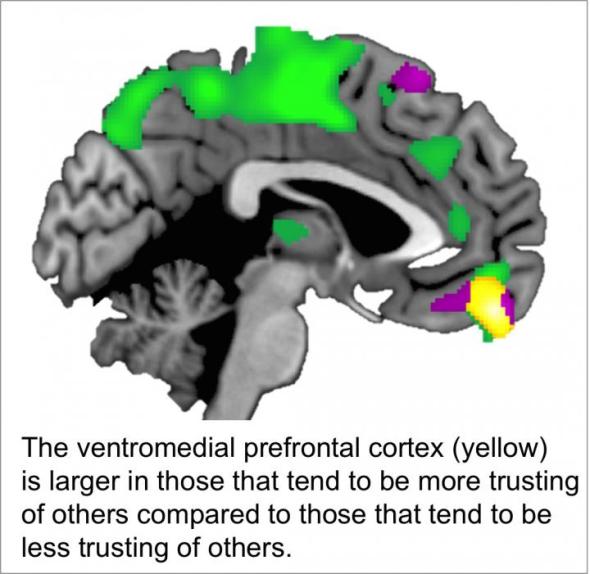Trust issues? It may be your brain structure
Ever feel too trusting, or maybe not trusting at all? Well a recent study shows differences in brain structure according to how trusting people are of others. Teasing out the intricacies of the brain hasn’t been an easy job; if it were we probably wouldn’t be intelligent enough to figure it out. Because of this complexity, we also have higher risk of psychological conditions. Interestingly enough, this research may have implications for future treatments of those conditions, conditions such as autism or other attachment disorders.
Each autism diagnosis is on a spectrum and varies, but in some cases, diagnosed with the condition exhibit problems trusting other people.
“There are conditions, like autism, that are characterized by deficits in being able to process the world socially, one of which is the ability to trust people,” Brian Haas, the study’s lead author said.
“Here we have converging evidence that these brain regions are important for trust; and if we can understand how these differences relate to specific social processes, then we may be able to develop more targeted treatment techniques for people who have deficits in social cognition.”
The team of researchers used two measures to determine the trust levels of 82 study participants.
Participants filled out a self-reported questionnaire about their tendency to trust others. They also were shown pictures of faces with neutral facial expressions and asked to evaluate how trustworthy they found each person in the picture. This gave researchers a metric, on a spectrum, of how trusting each participant was of others.
Researchers then took MRI scans of the participants’ brains to determine how brain structure is associated with the tendency to be more trusting of others. What researchers found, were differences in two areas of the brain.
“The most important finding was that the grey matter volume was greater in the ventral medial prefrontal cortex, which is the brain region that serves to evaluate social rewards, in people that tended to be more trusting of others,” he said.
“Another finding that we observed was for a brain region called the amygdala. The volume of this area of the brain, which codes for emotional saliency, was greater in those that were both most trusting and least trusting of others. If something is emotionally important to us, the amygdala helps us code and remember it.”

he ventromedial prefrontal cortex (yellow) is larger in those that tend to be more trusting of others compared to those that tend to be less trusting of others.
Image credit goes to: Brian Haas/University of Georgia
Future studies may focus on how, and if, trust can be improved and whether the brain is malleable according to the type of communication someone has with another. This might offer yet another way to help autistic children adapt to the world better. Furthermore, the research could also help abused children who suffer from conditions like reactive attachment disorder, a condition characterised by an inability to form attachments to a primary caregiver (parent, adoptive parent, other family members etc.).
Funny how a little thing like finding out how we trust, could have such big implications.
Sources:
Haas B.W., Ian W. Anderson & Megan M. Filkowski (2015). The tendency to trust is reflected in human brain structure, NeuroImage, 107 175-181. DOI: http://dx.doi.org/10.1016/j.neuroimage.2014.11.060




But enough about us, what about you?